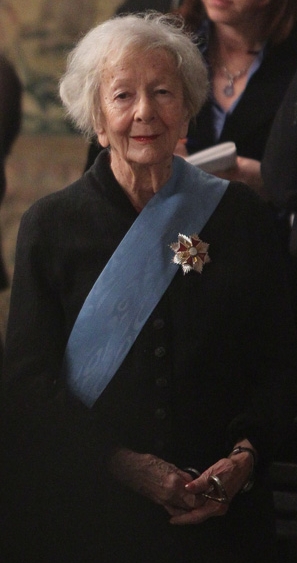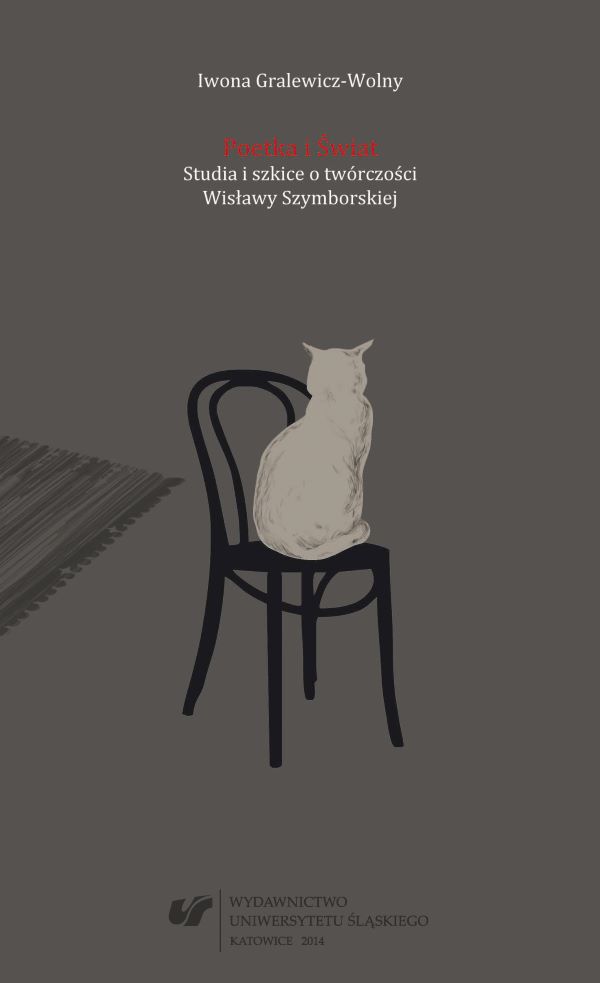
Wisława Szymborka | Photo: Wikimedia Commons
| Tomek Grząślewicz |
By virtue of a resolution of the Senate of the Republic of Poland, Wisława Szymborska became the parton of the year 2023. On the occasion of the Polish Science Day, it is worth taking a look at some of her poems, which may be inspiring for scientists from various fields. Our guide through the world of the Nobel Prize winner’s poetry is Iwona Gralewicz-Wolny, PhD, DLitt, Assoc. Prof. from the Faculty of Humanities of the University of Silesia, author of the book Poet and the World. Study and sketches on the works of Wisława Szymborska (University of Silesia Press, 2014).
On numbers
This adult male. This person on earth / Ten billion nerve cells. / Ten pints of blood pumped by ten ounces of heart. / This object took three billion years to emerge. (an excerpt from the poem A Film From the Sixties)
‘The meticulousness of calculations’ says Prof. Iwona Gralewicz-Wolny ‘leads to semantic emptiness.’
Despite this extraordinary accuracy, the above description does not allow us to know or imagine the person it refers to. Numbers are in fact only a small fragment of the truth, and the order they introduce is often apparent and does not correspond to human experience. Another poem by Szymborska, The Number Pi is also significant in this context, as the lyrical subject tries to grasp (without much success) the subsequent decimal numbers with a glance, calculation, imagination or even a joke.
On perception of time
Thirteen twenty exactly. / This waiting, it’s taking forever. / Any second now. / No, not yet. / Yes, now. / The bomb, it explodes. (an excerpt from the poem The Terrorist, He’s Watching)
We observe the scene seconds before the terrorist attack. The countdown to the explosion is suddenly interrupted. The inevitable is delayed by at least a fraction of a second. This is not, however, a malfunction of the watch, but a matter of individual perception of time. The hands of the clock move slower or faster for us depending on many factors, including age, emotional state and current events. ‘Subjective experience of time’ sums up Iwona Gralewicz-Wolny ‘eludes clock divisions and their numbers.’
On perpetual change
I’d have to be really quick / to describe clouds – / a split second’s enough for them / to start being something else. (an excerpt from the poem Clouds)
The passing of the clouds is not, and will never be, a final event. New ones will soon take their place, in different “shapes, shades, poses and arrangements”. ‘An astute cloud observer knows that the mechanism of constant transformation is in fact what protects nature from the tragedy of the beginning and the end’ notes the literary scholar from the University of Silesia.
On the (un)forgotten
They were or they weren’t. / On an island or not. / An ocean or not an ocean / swallowed them up or it didn’t. (an excerpt from the poem Atlantis)
Hundreds of literary works, films and computers have been devoted to this mythcal land since antiquity. It had been described by Platon, Arthur Conan Doyle and Jules Verne; and Wisława Szymborska wrote about it as well. Despite all the effort, involving the time and intellect of many people on many continents, Atlantis remains in our eyes nothing more than a ‘never-’ land, about which we know absolutely nothing. ‘The tragedy here is not so much the annihilation itself, as the anonymity and uncertainty in which Atlantis and its inhabitants have plunged’ notes prof. Iwona Gralewicz-Wolny.
On literature
[…] I will have to read by candlelight / what I’ve written by common bulb / tap tap tap on the typewriter–– / Not worried ahead of time, / whether it’s poetry / or what kind of poetry–– / Is it the kind where prose is inappropriate–– / or the kind that’s appropriate in prose–– (an excerpt from the poem Stage Fright)
In Stage Fright the poet points out stereotypes about poetry, its context and reception. The main theme of the poem is an ironically presented author meeting by candlelight, with candles standing on a table “on gilded legs”. Equally noteworthy, however, is the distance of the lyrical subject towards attempts to pigeonhole poetry, setting its boundaries and categorically separating it from prose. ‘The expectation of “pure poetry”, i.e. one that has been deprived of the admixture of prose, is an attempt to strip a poem of reality’ writes the literature expert from the University of Silesia.

Cover of the book Poet and the World by Iwona Gralewicz-Wolny
On nature
I have names for you: / maple, burdock, liverwort, / eather, juniper, mistletoe, and forget-me-not; / but you have none for me. (an excerpt from the poem The Silence of Plants)
Although from the perspective of plants humans are anonymous, the poet, undaunted by this fact, makes further attempts to establish a “dialogue” with organisms with which she has much in common (for example, they both cast a shadow). The mere fact of looking at a tree, noticing its presence, means establishing a relationship with it. ‘It is precisely this type of meetings with nature, meetings in which the emphasis is shifted from communication to contact itself’ explains prof. Iwona Gralewicz-Wolny.
On helplessness
My apologies to great questions for small answers (an excerpt from the poem Under One Small Star).
In characteristic of her, concise style, the poet formulates a thought that can be related to the general cognitive condition of the human race. After all, there are still hundreds of questions that modern science has not found an answer to, or has only partially answered. Prof. Iwona Gralewicz-Wolny emphasises that the confession of “ignorance” is repeated regularly in the poetry of the Nobel Prize winner:
‘This “I don’t know”, which is the basis of Szymborska’s theoretical literary project, returns like a mantra in her poems, being a constant expression of helplessness in the face of the meanders of the world and our existence in it, but also the only right attitude that can be taken towards them.’
The poet herself made the words “I don’t know” the focal point of her Nobel Prize lecture, delivered on 7 December 1996 at the Swedish Academy:
‘Had my compatriot Marie Sklodowska-Curie never said to herself “I don’t know”, she probably would have wound up teaching chemistry at some private high school for young ladies from good families, and would have ended her days performing this otherwise perfectly respectable job. But she kept on saying “I don’t know,” and these words led her, not just once but twice, to Stockholm, where restless, questing spirits are occasionally rewarded with the Nobel Prize.’
The book by Iwona Gralewicz-Wolny, PhD, DLitt, Assoc. Prof. Poet and the World. Study and sketches on the works of Wisława Szymborska is available on the website of the University of Silesia Press.





